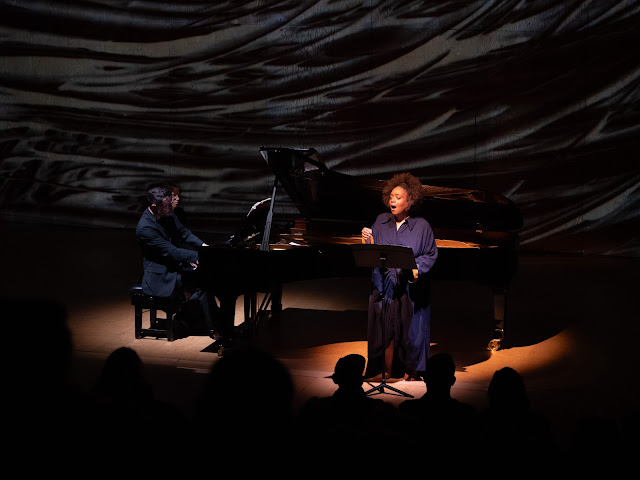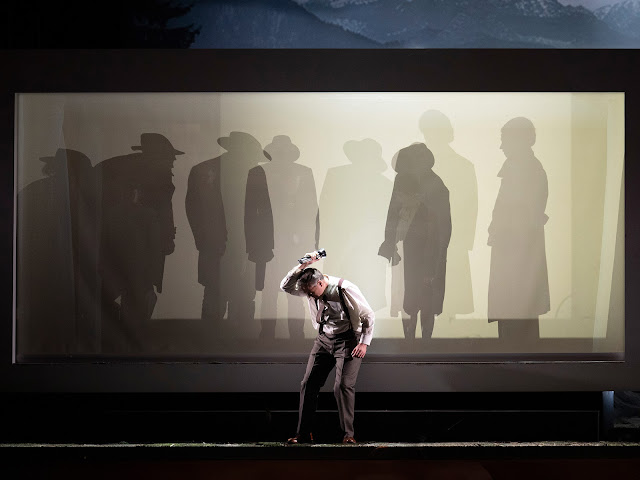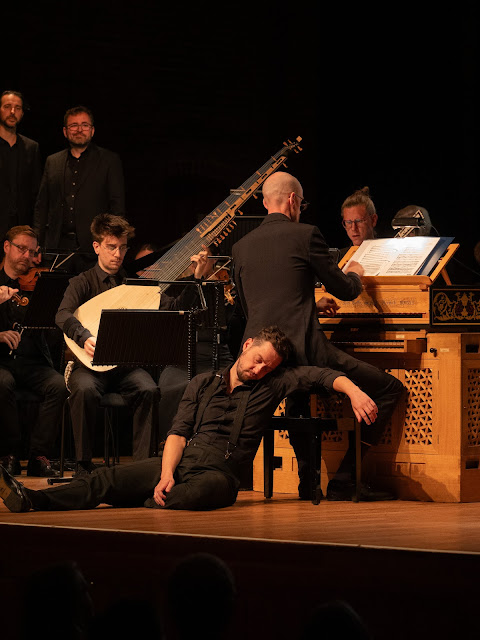 |
| Messiaen: Hawari – Gweneth Ann Rand, Simon Lepper – Britten Studio, Snape Maltings, Aldeburgh Festival (Photo Britten Pears Arts) |
Judith Weir: Blond Eckbert; English Touring Opera, dir. Robin Norton-Hale, cond. Gerry Cornelius
Messiaen song-cycles; Gweneth Ann Rand, Simon Lepper
Brtitten, Elgar, Shostakovich; London Philharmonic Orchestra, Alban Gerhardt, cond. Edward Gardner
Schumann and Larcher: André Schuen, Julius Drake
Henry Purcell: The Fairy Queen; Vox Luminis, Tuomo Suni, artistic director, Lionel Meunier
Reviewed by Tony Cooper (12 June 2024)
The Aldeburgh Festival’s opening weekend included highlights such as British soprano, Gweneth Ann Rand, singing three Messiaen song-cycles over three concerts in the Britten Studio accompanied by pianist, Simon Lepper
Founded by Benjamin Britten, Peter Pears and Eric Crozier in 1948, the Aldeburgh Festival (now celebrating its 75th edition) got off to a spirited and inspiring start with a new production of Judith Weir’s chamber opera Blond Eckbert in Snape Maltings Concert Hall conducted by Gerry Cornelius.
Based on a supernatural short story by the German-born writer, Ludwig Tieck, one of the founding fathers of the Romantic movement of the late 18th and early 19th centuries, the opera was directed by Robin Norton-Hale and produced by English Touring Opera in association with Britten Pears Arts with the composer – now in her 70th year and one of this year’s artists-in-residence – responsible for the libretto.
A haunting tale of isolation and enigma, the scenario surrounds Eckbert (sung by baritone Simon Wallfisch) and his wife Berthe (mezzo-soprano Flora McIntosh) living a life of quiet solitude in their cosy forest home in the Harz Mountains until Walther, an old friend of Eckbert, sung by tenor William Morgan, arrives at their doorstep on a rough and tough stormy night thereby setting in motion a series of revelations, mysteries and intrigue.
 |
| Judith Weir: Blond Eckbert – English Touring Opera – Snape Maltings, Aldeburgh Festival (Photo copyright Richard Hubert Smith) |
As dark secrets unfold, Eckbert suspects his world is far stranger than it first appears and that the past is most probably best left untouched. A very intense work, the scenario’s not too dissimilar to that of Wagner’s Die Walküre inasmuch as the story has a bird-like character sung by soprano Aoife Miskelly. However, Bird accompanies Eckbert, neurotically charged and suspicious of his old friend, on a journey of discovery, jealousy and, ultimately, death as opposed to the Woodbird who leads Siegfried on a journey of discovery and happiness to Brünnhilde his bride-to-be.
In the intimacy and bright acoustics of the Britten Studio, Northampton-born soprano, Gweneth Ann Rand, currently an associate artist at the Wigmore Hall, was seen on ravishing form singing to a packed house Messiaen’s song-cycle, Harawi: Chant d’amour et de mort, dating from 1945, accompanied by her regular collaborator/pianist, Simon Lepper. They made a perfect team! Without a shadow of doubt, Ms Rand’s ‘a grande soprano dramatique’ as Messiaen demanded for Harawi. The energy she put into her performance was truly magnificent while her voice control, phrasing and technique spoke volumes of her training and, indeed, her natural ability as a singer. In fact, this was the first of three Messiaen recitals that she’s undertaking at this year’s festival – a big treat for me being such a Messiaen fan. However, adding an extra dimension and, indeed, attraction to the overall staging, a host of stunning multi-coloured abstract artworks, created by Rachel Jones, were regularly flashed on to a backcloth highlighted by short, sharp, blasts of video images conjured up by Ben Smalley.
Following on from Ms Rand’s charming and intimate recital, a battalion of musicians descended upon the rural Suffolk countryside, namely members of the London Philharmonic Orchestra, to give the 75th anniversary of Aldeburgh Festival its first ‘big blow’ in a concert in Snape Maltings Concert Hall that proved a winner all the way to yet another packed and enthusiastic house. However, before Shostakovich’s Festival Overture got proceedings off to a rousing and spirited start, Edward Gardner took to the podium singing the praises of Roger Wright, CBE, Chief Executive, Britten Pears Arts, who retires this year after a glorious decade at the helm.
And then unbeknown to the ‘man-of-the-moment’ the brass and timpani of the LPO led straight into a Fanfare in his honour penned by Colin Matthews that stamped the credentials and punctuated a brilliant concert that featured Berlin-born cellist, Alban Gerhardt (one of this year’s artists-in-residence) offering a delightful rendering of Elgar’s well-loved Cello Concerto in E minor followed by Edward Gardner’s arrangement of selections from Britten’s The Prince of the Pagodas, a ballet created for The Royal Ballet by choreographer John Cranko receiving its première on 1st January 1957 at the Royal Opera House with the composer conducting.
Completing an exhilarating, fulfilling and thoroughly entertaining concert fell to Bartók’s suite from The Miraculous Mandarin, a one-act pantomime ballet composed between 1918 and 1924 based on a riveting story by Hungarian writer, Melchior Lengyel. The ballet caused a scandal at its première at Cologne Opera in 1926 as the scenario centres upon three thugs who exploit the seductive powers of beautiful young women to lure men into their chamber where the victims are then robbed. Cologne’s clergy and press caused the city’s mayor, Konrad Adenauer (later becoming the first chancellor of post-war West Germany) to ban the work on moral grounds. When the dust eventually settled, the work was generally performed during the rest of Bartók’s life in the form of a concert suite.
Returning to the Britten Studio, a stunning and adventurous song recital featured the Austrian baritone André Schuen accompanied by Julius Drake. A couple of works by Schumann were wrapped round a new piece by Austrian composer, Thomas Larcher, who’s no stranger to Aldeburgh as he was composer-in-residence at the 2019 festival. He delivered a brilliant chamber opera, The Hunting Gun, directed with flair and imagination by the acclaimed Austrian actor/film director, Karl Markovics. A formidable piece, the opera’s based upon the best-selling post-war Japanese novella The Hunting Gun by Yasushi Inoue published in 1949 telling the story of a secret love-affair through the letters of three people.
However, Larcher’s new piece, Unerzählt, composed between 2018-21, takes its text from the highly acclaimed German-born writer, W.G. Sebald, author of the cult novels Austerlitz and Vertigo, arguably one of the most celebrated writers to have studied and taught at the University of East Anglia. Sadly, he died after a collision with a lorry at a bend in the road near his home in Norwich at the age of 57. Professor of European Literature at UEA, he was seen by many of his associates and friends of winning the Nobel Prize for Literature. He first came to prominence when his novel about the Holocaust, The Emigrants, was published in English in 1996. The critic Susan Sontag said it was ‘an astonishing masterpiece’.
I think that Larcher’s 20-minute work, scored for prepared piano, was astonishing to say the least. A cycle of 13 very short sections, the work was gracefully and meticulously sung by Schuen with the composer acting as the page-turner for Julius Drake while assisting him in the complexities of the oddities of the score such as using their fingers either to damp the strings, pluck them or bend their pitch while metal rods were evenly placed on the strings to achieve a propeller-type effect. Even the frame of the piano was struck with a handle of a screwdriver for a couple of songs. The overall effect, however, worked wonders adding greatly to the attraction of the piece with Schuen completely at ease delivering a confident, well-assured, detailed performance.
Opening with Schumann’s Liederkreis, a cycle of 12 musical settings of poems by Joseph von Eichendorff, forming an important part of the romantic art-song repertoire, the recital ended with Schumann’s Dichterlibe (A Poet’s Love) dating from 1840 and the composer’s best-known song-cycle. The texts for its 16 songs come from Lyrisches Intermezzo by Heinrich Heine written in 1822-23. Along with the song-cycles of Schubert (Die schöne Müllerin and Winterreise) they form the core of the genre in musical literature.
 |
| Purcell: The Fairy Queen – Vox Luminis – Snape Maltings, Aldeburgh Festival (Photo: Britten Pears Arts) |
Fairies and suchlike were running riot in Snape Maltings Concert Hall with a memorable semi-staged performance of Purcell’s The Fairy-Queen set to the original anonymous text after Shakespeare’s A Midsummer Night’s Dream but with new material by Isaline Claeys and additional material/English translation by actor Simon Robson who acted as the Narrator. Before coming to the stage, Robson studied Philosophy and Social and Political Science at Cambridge University before training to be an actor at RADA. He has appeared in Doctors, Tom & Viv, Bodywork and Trial and Retribution as well as EastEnders playing Graham Stone.
And the strong, confident, sprightly bunch of exceptional and talented singers that make up Vox Luminis – producers of the show in association with Concertgebouwe Brugge – acted extremely well, too, while concept and shadow puppetry was well conceived by Emilie Lauwers who along with Mário Melo Costa’s video designs helped enormously the visual impact of the production.
To add to the overall stage picture, David Carney’s simplistic set and moody lighting was in keeping with each of the five scenes while the choreographed curtain-call was a scene all wrapped up by itself. This Fairy-Queen was delectable and a tasteful show all round, dispensing love, promise and intrigue like no other!
The Aldeburgh Festival runs to Sunday 23 June.
Never miss out on future posts by following us
The blog is free, but I’d be delighted if you were to show your appreciation by buying me a coffee.
Elsewhere on this blog
- The Devil’s Den: I chat to composer Isabella Gellis & conductor Finnegan Downie Dear about the new opera Shadwell Opera is presenting at the Nevill Holt Festival – interview
- Engaging, with an imaginative twist: Rossini’s The Barber of Seville at Opera Holland Park – opera review
- A very modern sort of magic: Handel’s Alcina at the Guildhall School of Music and Drama – opera review
- Sensitive solo performances, youth choirs and with a rediscovery of the original orchestral sound: Elgar’s The Dream of Gerontius from Gabrieli, Paul McCreesh, Nicky Spence – record review
- Taking the woman’s side: Poulenc’s La voix humaine and Fiançailles pour rire from Paula Sides and Sergey Rybin – record review
- An Evening of Don Juan: SongEasel’s imaginative programme certainly brings song to South East London in vivid performances from Ella Taylor and Jocelyn Freeman – concert review
- Back to the 1960s: Opera Holland Park returns to its 2008 production of Tosca and creates a satisfying evening in the theatre – opera review
- Telling a story: Solomon’s Knot in stylishly vivid form for the Canon’s version of Handel’s Esther – concert review
- Doing Vivaldi proud: his Olympic opera performed with verve & imagination by Irish National Opera – opera review
- Creating something remarkable: Fatma Said & Joseph Middleton in Mozart, Schubert, Schumann, de Falla, Obradors & Hankash – concert review
- Home










